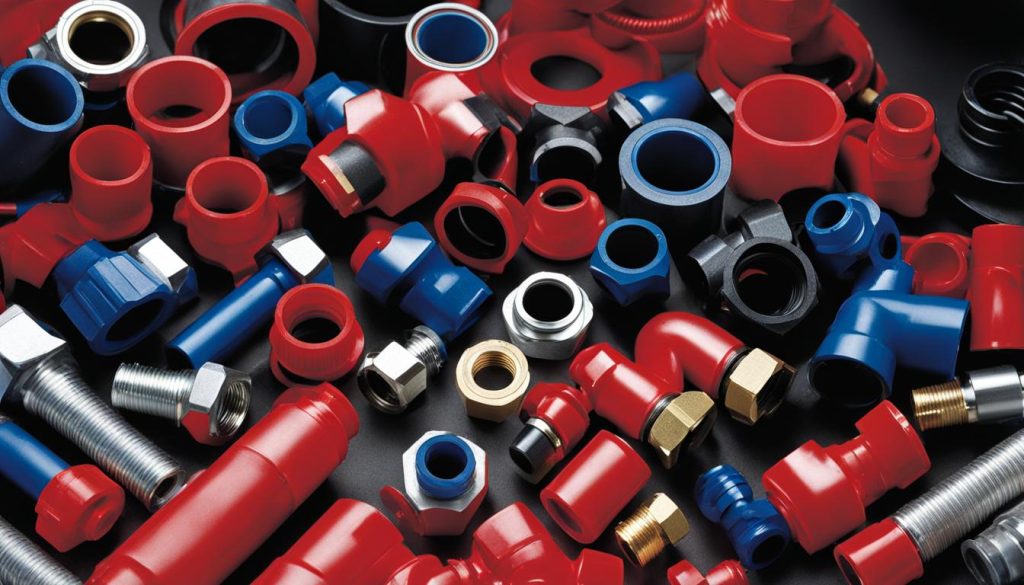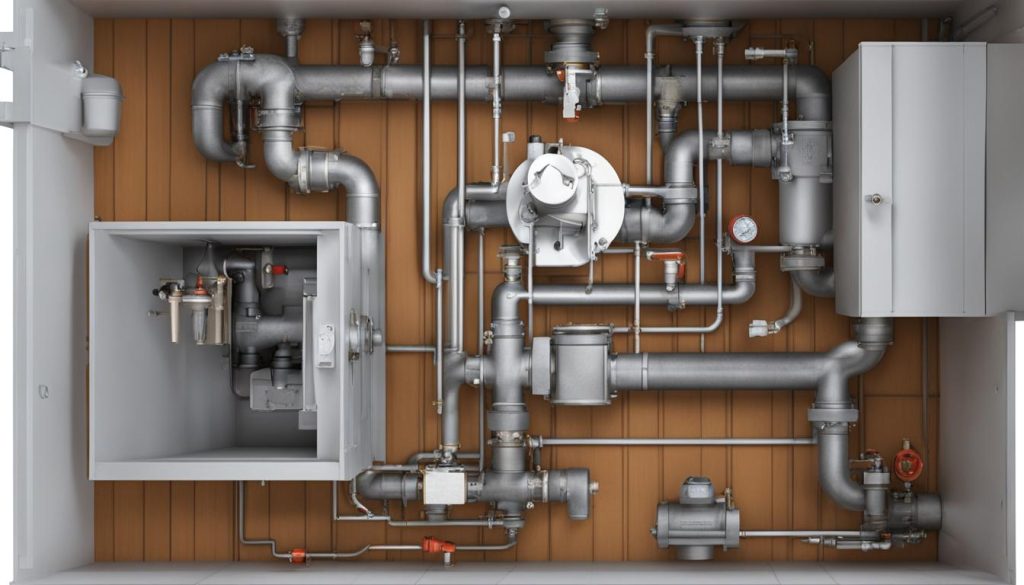Mobile Home Plumbing Fittings Essentials
Did you know that mobile homes have unique plumbing systems that must meet national HUD codes? With over 17,000 mobile home communities in Canada, understanding the basics of mobile home plumbing is essential to ensure proper upkeep and functionality.
In this article, I will guide you through the essentials of mobile home plumbing fittings, accessories, and parts. From the different types of plumbing materials used to the location of pipes and common issues faced by mobile homeowners, we will cover it all. So let’s dive in and learn everything you need to know about mobile home plumbing!
Key Takeaways:
- Mobile homes have unique plumbing systems that must meet national HUD codes.
- Understanding mobile home plumbing essentials is crucial for proper upkeep and functionality.
- Knowing the different types of plumbing materials and their uses is important for repairs and maintenance.
- Mobile home plumbing pipes are typically located under the floor, and regular maintenance is vital for optimal performance.
- Addressing leaks, clogs, and frozen water lines promptly can help prevent costly damage and repairs.
Mobile Home Plumbing System Components
In order to understand the plumbing system in a mobile home, it is important to familiarize yourself with its key components. The mobile home plumbing system consists of three main parts: supply lines, drain-waste lines, and ventilation lines.
Supply Lines
The supply lines are responsible for transferring water from the mainline to the various fixtures throughout the mobile home. These lines are commonly made of copper or Pex, which is a durable and flexible material. By connecting the supply lines to the main water source, the fixtures such as sinks, showers, and toilets receive a steady supply of water.
Drain-Waste Lines
Drain-waste lines, as the name suggests, are responsible for removing waste and wastewater from the fixtures and carrying it away from the mobile home. These lines utilize gravity and traps to ensure efficient drainage. By connecting the fixtures to the drain-waste lines, the waste is safely and hygienically disposed of.
Ventilation Lines
Ventilation lines play a crucial role in regulating the airflow within the mobile home plumbing system. By providing ventilation, these lines help maintain proper pressure and prevent airlocks, which can impede the flow of water. Properly functioning ventilation lines contribute to the overall effectiveness of the plumbing system.
Mobile home plumbing supplies include a wide range of fixtures such as sinks, showers, and toilets. These fixtures are designed specifically for mobile homes and are available in various styles and sizes to suit different needs. Additionally, mobile home plumbing connectors are essential for the proper installation of these fixtures, ensuring a secure and leak-free connection with the plumbing system.
Having a good understanding of the components of a mobile home plumbing system, as well as the availability of mobile home plumbing supplies and fixtures, is crucial for effective maintenance, repairs, and upgrades.
Plumbing Piping Materials in Mobile Homes
In mobile homes, a variety of piping materials are used for the plumbing system. These materials are carefully selected based on their specific characteristics and suitability for different applications. Understanding the different types of piping materials can help homeowners make informed decisions when it comes to mobile home plumbing.
Below are some common piping materials used in mobile homes:
PVC
PVC (Polyvinyl Chloride) pipes are commonly used for high-pressure cold water lines in mobile homes. They are affordable, lightweight, and easy to install. PVC pipes are resistant to corrosion and offer excellent durability. Their smooth surface helps prevent clogs and ensures efficient water flow.
CPVC
CPVC (Chlorinated Polyvinyl Chloride) is a variant of PVC that is suitable for both hot and cold water applications. CPVC pipes can withstand higher temperatures compared to PVC pipes, making them ideal for mobile home plumbing systems.
PEX
PEX (Cross-linked Polyethylene) pipes are flexible and have excellent resistance to heat, making them a popular choice for mobile home plumbing. PEX pipes can expand and contract without causing damage, making them less prone to bursting. They are also resistant to corrosion, making them a long-lasting option.
PolyPipe®
PolyPipe® is a flexible polyethylene pipe that is commonly used for underground applications. It is resistant to chemicals, corrosion, and rust, making it an ideal choice for mobile home water line fittings that are buried underground. PolyPipe® is durable and offers excellent longevity.
Copper
Copper pipes are known for their corrosion resistance and durability. They are commonly used for water supply lines in mobile homes. Copper pipes are also resistant to high temperatures, making them suitable for both hot and cold water applications.
Galvanized Steel
Galvanized steel pipes are strong, durable, and resistant to corrosion. They are commonly used for water supply lines in older mobile homes. However, galvanized steel pipes are being phased out due to their susceptibility to rust and limited lifespan.
When installing or repairing the plumbing system in a mobile home, it is important to choose the appropriate piping material based on the specific requirements and local building codes. Mobile home piping fittings and adapters are available to connect and adapt pipes of different materials, ensuring a secure and efficient plumbing system.
Location and Maintenance of Mobile Home Plumbing Pipes
When it comes to mobile home plumbing, understanding the location of pipes is crucial for repairs and connecting water lines. In most cases, the pipes are located under the floor and enter the home through heating ducts. By knowing where the pipes are located, you can easily access them for maintenance or repairs.
Regular maintenance is essential for ensuring the efficient functioning of your mobile home plumbing system. Here are some important tasks to include in your maintenance routine:
- Checking for leaks: Regularly inspect your pipes for any signs of leaks or drips. Even small leaks can lead to significant damage if left untreated. If you notice any leaks, it’s important to address them promptly to prevent further issues.
- Cleaning drain lines: Over time, drain lines can become clogged with debris and buildup. Regularly cleaning your drain lines can help prevent clogs and ensure smooth water flow.
- Inspecting seals: Check the seals around your plumbing fixtures such as sinks, toilets, and showers. Damaged or deteriorated seals can cause leaks and water damage. Replace any worn-out seals to maintain a watertight connection.
- Maintaining proper water pressure: Low water pressure can be a sign of issues with your plumbing system. Make sure to regularly check your water pressure and address any abnormalities. In some cases, you may need to adjust the pressure regulator or seek professional help.
Maintaining Your Mobile Home Plumbing System
Proper maintenance of your mobile home plumbing system is key to avoiding costly repairs and ensuring a reliable water supply. By performing regular checks, addressing leaks promptly, and keeping your drain lines clean, you can extend the lifespan of your plumbing system and enjoy hassle-free water usage.
Remember, if you’re unsure about any plumbing repairs or maintenance tasks, it’s always best to seek professional help. Plumbing issues should not be overlooked or underestimated, as they can lead to extensive damage if left unattended.
Common Mobile Home Plumbing Issues and Solutions
Mobile home plumbing systems can be susceptible to various issues that require prompt attention to ensure the proper functioning of your mobile home. Here are some common plumbing problems that mobile homeowners may encounter:
- Leaky pipes and faucets
- Clogged drains and toilets
- Rusted and corroded pipes
- Frozen water lines
Leaky pipes and faucets can lead to water damage if not addressed immediately. It’s important to check for any signs of leakage and repair or replace the affected pipes or faucets as needed.
Clogged drains and toilets can cause inconvenience and sewage backups. To prevent clogs, consider using drain covers to catch debris and regularly clean your drains. If a clog occurs, you can try using a plunger or a drain snake to clear the obstruction. If the problem persists, seeking professional help may be necessary.
Rusted and corroded pipes are common in older mobile homes. Over time, the corrosion can weaken the pipes, leading to leaks and even bursting. Replacement of rusted or corroded pipes is essential to avoid further damage and maintain a reliable plumbing system.
Frozen water lines can occur during cold winter months, increasing the risk of burst pipes. To prevent frozen water lines, ensure proper insulation of pipes in vulnerable areas such as crawl spaces or exteriors. Regular maintenance, checking for insulation gaps, and using heat tapes can help protect against freezing.
Addressing these common plumbing issues promptly can save you from more expensive repairs and potential water damage in your mobile home.
Common Solutions for Mobile Home Plumbing Issues:
Here are some solutions to address the common plumbing issues in mobile homes:
- Identify and repair leaks as soon as possible to prevent water damage.
- Regularly clean drains and use drain covers to prevent clogs.
- Consider replacing rusted or corroded pipes to maintain a reliable plumbing system.
- Ensure proper insulation of water lines to prevent freezing during cold weather.
- Seek professional help when needed, especially for complex repairs or if unsure how to address plumbing issues.
By addressing plumbing issues promptly and following preventive maintenance measures, you can ensure a well-functioning plumbing system in your mobile home.
| Common Mobile Home Plumbing Issues | Solutions |
|---|---|
| Leaky pipes and faucets | Identify and repair leaks as soon as possible to prevent water damage. |
| Clogged drains and toilets | Regularly clean drains and use drain covers to prevent clogs. |
| Rusted and corroded pipes | Consider replacing rusted or corroded pipes to maintain a reliable plumbing system. |
| Frozen water lines | Ensure proper insulation of water lines to prevent freezing during cold weather. |
Mobile Home Plumbing Repairs and Maintenance
Regular maintenance and inspections are vital for the proper functioning of mobile home plumbing systems. As a mobile home owner, it is important to stay proactive and address any plumbing issues promptly to avoid costly repairs. Here are some essential maintenance tasks and repairs to keep your mobile home plumbing system in top shape:
1. Maintenance Tasks
- Check for Leaks: Regularly inspect your plumbing system for any signs of leaks. Look for water stains, dampness, or dripping pipes. Addressing leaks promptly can prevent water damage and reduce the risk of mold and mildew.
- Clean Drain Lines: Over time, drain lines can become clogged with debris, soap scum, and hair. Use a drain cleaner or a mixture of baking soda and vinegar to keep your drain lines flowing smoothly.
- Inspect Seals and Valves: Check the seals and valves on your fixtures to ensure they are tight and functioning properly. Replace any worn-out seals or faulty valves to prevent leaks.
- Inspect the Overall Plumbing System: Take a thorough look at your entire plumbing system. Check for any signs of corrosion, rust, or damage. Look for loose connections or worn-out parts that may need replacement.
Regular maintenance tasks are crucial in identifying potential issues early on and preventing major problems down the line.
2. Crucial Repairs
While regular maintenance can help prevent many plumbing issues, there are some repairs that may be necessary over time:
- Address Leaks and Clogs Promptly: Whether it’s a dripping faucet or a clogged toilet, addressing leaks and clogs promptly will help prevent further damage. Ignoring these issues can lead to water damage and costly repairs.
- Replace Rusted or Corroded Pipes: If you notice any rusted or corroded pipes, it’s important to replace them. Rust and corrosion weaken the pipes, increasing the risk of leaks and bursts.
- Prevent Frozen Water Lines: Insulate any exposed water lines and disconnect garden hoses during colder months to prevent freezing. Frozen water lines can cause burst pipes, leading to significant damage.
For complex repairs or if you are unsure how to address plumbing issues in your mobile home, it is always recommended to seek professional help from a licensed plumber.
Regular maintenance and timely repairs are key to ensuring a well-functioning mobile home plumbing system. By staying proactive and addressing issues promptly, you can avoid costly repairs and maintain the efficiency and longevity of your plumbing system.
Mobile Home Plumbing Tips and Conclusion
When it comes to mobile home plumbing, proper knowledge and maintenance are key to ensuring optimal performance. As a mobile homeowner, there are a few tips and practices you can follow to keep your plumbing system in excellent condition.
Firstly, regular inspections are crucial. Take the time to visually inspect your plumbing system for any leaks, drips, or signs of damage. Address any issues promptly to prevent further damage and potential water wastage.
Secondly, don’t ignore leaks and clogs. Even a small drip can lead to significant water damage over time, and a clogged drain can cause backups and potential plumbing emergencies. Be proactive in addressing these issues either by fixing them yourself or seeking professional help, if needed.
Additionally, proper insulation is essential, particularly in preventing frozen water lines during the colder months. Insulate exposed pipes and consider using heat tape or pipe insulation sleeves to protect against freezing temperatures.
By following these tips and staying proactive with your mobile home plumbing maintenance, you can ensure a long-lasting and efficient system. Remember that the functionality and safety of your mobile home greatly depend on a well-maintained plumbing system. Take care of your plumbing, and it will take care of you.
Source Links
- https://www.sellmobilehome.com/blog/plumbing-for-mobile-homes-what-you-need-to-know/
- https://mobilehomepartsstore.com/latestnews/plumbing-basics-for-mobile-homes/
- https://www.homedepot.ca/en/home/categories/building-materials/plumbing/pipe-and-fittings.html
- Investing Wisely: How Windows & Doors in Boost Property Value and Financial Health - April 24, 2025
- The Financial Impact of Personal Injuries: Why Legal Help Matters for Business Owners - April 16, 2025
- The Hidden Financial Costs of Domestic Assault: What Business Owners Need to Know - April 16, 2025













